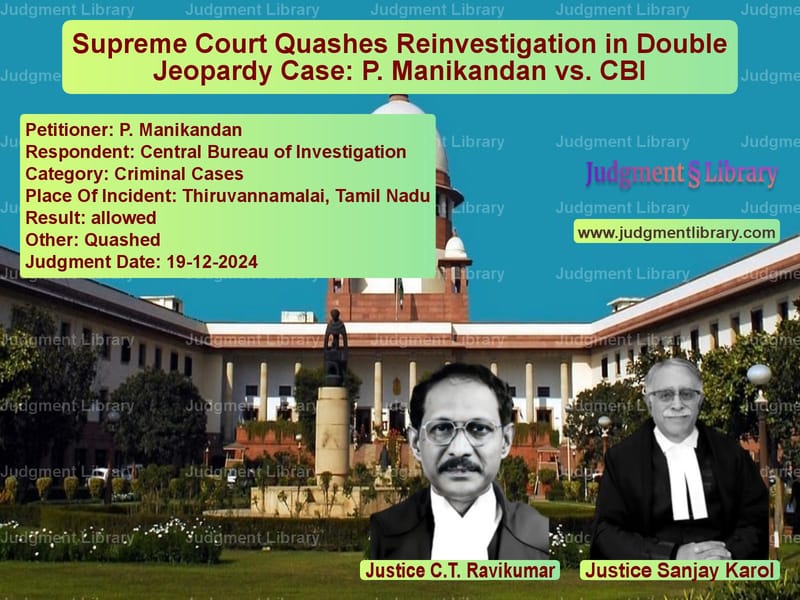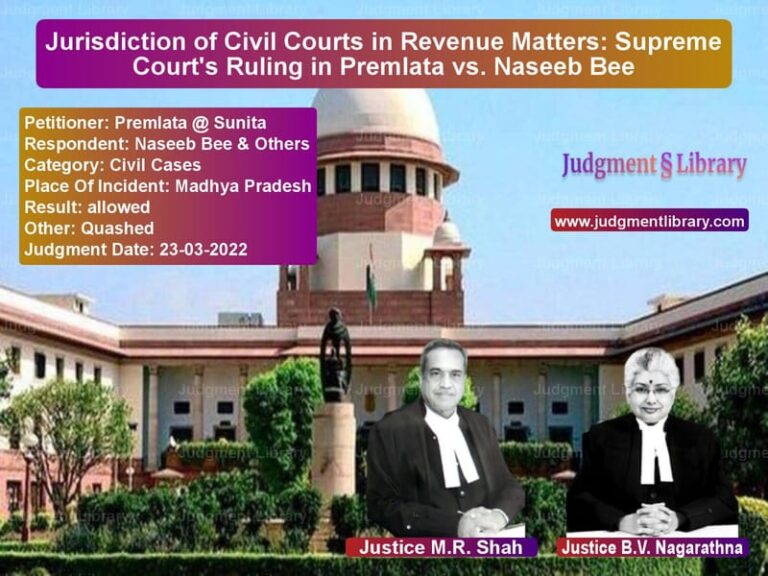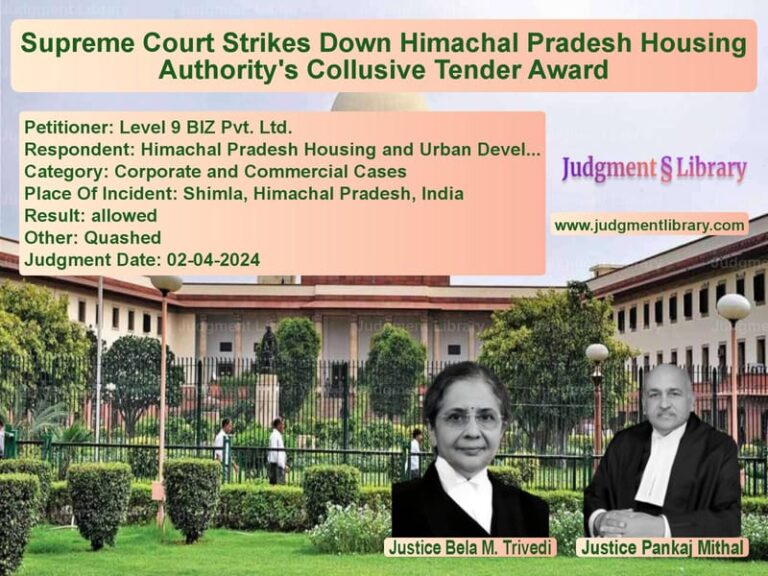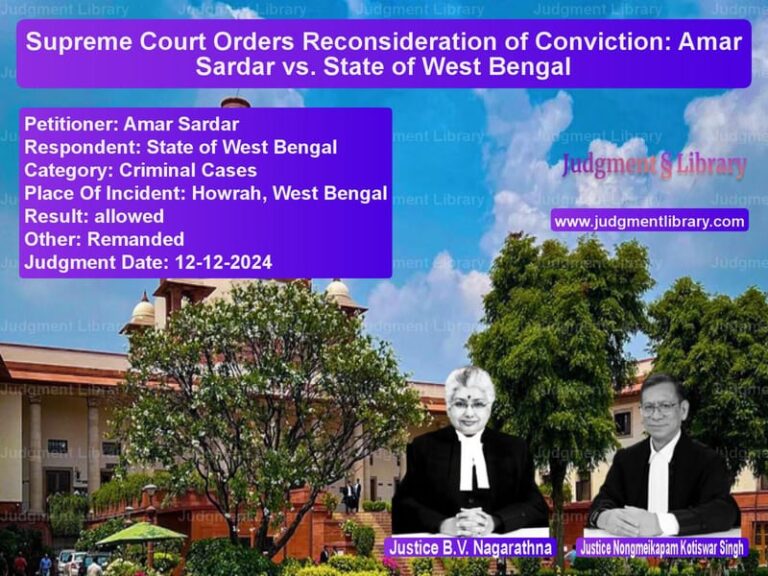Supreme Court Quashes Reinvestigation in Double Jeopardy Case: P. Manikandan vs. CBI
The Supreme Court of India has delivered a crucial judgment in the case of P. Manikandan vs. Central Bureau of Investigation (CBI), ruling that a person cannot be subjected to reinvestigation and retrial after being acquitted on the same charges. The judgment reaffirms the constitutional protection against double jeopardy and clarifies the limitations of appellate court powers in ordering reinvestigation.
Background of the Case
The case originates from a tragic incident that occurred on June 13, 2013, involving the alleged kidnapping and murder of a four-year-old girl in Tamil Nadu. The appellant, P. Manikandan, was accused of abducting the child from her school and murdering her due to a financial dispute with her father.
Initially, the case was investigated by the local police, and Manikandan was convicted by the Fast Track Mahila Court, Thiruvannamalai. He was sentenced to life imprisonment under Section 364A IPC and death penalty under Section 302 IPC. The case was then referred to the Madras High Court for confirmation of the death penalty.
Madras High Court’s Acquittal and Order for Reinvestigation
Upon appeal, the Madras High Court found that the prosecution had failed to prove the guilt of the appellant beyond reasonable doubt. The Court noted significant lapses in the investigation and ruled that there was no evidence linking Manikandan to the crime.
Despite acquitting the appellant, the High Court directed the CBI to conduct a de novo investigation and file a fresh chargesheet if necessary. The CBI proceeded with the reinvestigation, filed a new chargesheet in 2020, and Manikandan was again charged for the same offense.
Appellant’s Arguments
Manikandan challenged the CBI’s fresh chargesheet and the ongoing trial, arguing that:
- Double Jeopardy: His retrial violated Article 20(2) of the Constitution, which protects individuals from being prosecuted or punished for the same offense more than once.
- Section 300 CrPC: The criminal procedure code explicitly prohibits a second trial on the same charges after acquittal.
- No Authority for Reinvestigation: The appellate court had no power under Section 386(b)(i) of the CrPC to order a fresh investigation.
- Finality of Acquittal: Once an acquittal is granted, it remains in force, and no new trial can be initiated on the same facts.
CBI and Respondents’ Counterarguments
The CBI contended that:
- The acquittal was based on procedural lapses and not on the merits of the case.
- Section 386 of CrPC grants the appellate court powers to order a new trial if irregularities have led to a miscarriage of justice.
- The principle of double jeopardy applies only when a person has been both prosecuted and punished; in this case, the acquittal order allowed for further investigation.
Supreme Court’s Analysis
The Supreme Court, led by Justices C.T. Ravikumar and Sanjay Karol, examined the legal and constitutional issues in depth. The Court ruled that:
1. Double Jeopardy Protection is Absolute
The Court reaffirmed that under Article 20(2) of the Constitution and Section 300 of CrPC, a person cannot be prosecuted again for the same offense once acquitted.
“The acquittal awarded by the High Court has to remain in force for the cardinal principle of criminal jurisprudence of innocent until proven guilty applies and cannot be displaced except in circumstances otherwise provided by law.”
Read also: https://judgmentlibrary.com/bail-under-uapa-supreme-courts-judgment-on-athar-parwezs-case/
2. Appellate Courts Cannot Order Reinvestigation
The Supreme Court clarified that appellate courts have powers to order a retrial but not a reinvestigation. Section 386 of CrPC does not grant the power to transfer an acquitted case for fresh investigation.
“Section 386(b) of CrPC enumerates the power of the appellate court, which includes the power to order the appellant to be retried, but not to be reinvestigated.”
3. The High Court’s Order Was Unlawful
The Court ruled that the Madras High Court exceeded its jurisdiction by directing a de novo investigation after acquitting the accused. The correct procedure would have been to either uphold or reverse the acquittal.
“The direction of the High Court, transferring the investigation to CBI and directing them to reinvestigate the offense, was without the authority of law and, therefore, has to be set aside.”
Final Judgment
The Supreme Court ruled:
- The reinvestigation and fresh chargesheet filed by the CBI were quashed.
- The appellant, P. Manikandan, was acquitted of all charges.
- The order of the Madras High Court directing a de novo investigation was set aside.
- All proceedings against the appellant were declared null and void.
Implications of the Judgment
This ruling has significant implications for Indian criminal jurisprudence:
- Strengthening Double Jeopardy Protections: This judgment reaffirms that no individual can be tried twice for the same offense, ensuring constitutional safeguards are upheld.
- Clarifying Appellate Court Powers: The Court clarified that while appellate courts can order retrials, they cannot direct fresh investigations.
- Judicial Oversight on Investigative Agencies: The ruling restricts the ability of investigative agencies to reopen cases after an acquittal, preventing misuse of power.
- Upholding Fair Trial Principles: The judgment ensures that once an individual is acquitted, they cannot be subjected to repeated trials, preserving the right to a fair legal process.
Conclusion
The Supreme Court’s verdict in P. Manikandan vs. CBI is a landmark decision that reinforces constitutional and procedural protections against double jeopardy. By quashing the reinvestigation and fresh chargesheet, the Court has upheld the fundamental rights of the accused and provided a strong precedent for future cases. This ruling ensures that individuals cannot be subjected to endless litigation and that justice is served in a fair and lawful manner.
Petitioner Name: P. Manikandan.Respondent Name: Central Bureau of Investigation.Judgment By: Justice C.T. Ravikumar, Justice Sanjay Karol.Place Of Incident: Thiruvannamalai, Tamil Nadu.Judgment Date: 19-12-2024.
Don’t miss out on the full details! Download the complete judgment in PDF format below and gain valuable insights instantly!
Download Judgment: p.-manikandan-vs-central-bureau-of-in-supreme-court-of-india-judgment-dated-19-12-2024.pdf
Directly Download Judgment: Directly download this Judgment
See all petitions in Bail and Anticipatory Bail
See all petitions in Custodial Deaths and Police Misconduct
See all petitions in Juvenile Justice
See all petitions in Judgment by C.T. Ravikumar
See all petitions in Judgment by Sanjay Karol
See all petitions in allowed
See all petitions in Quashed
See all petitions in supreme court of India judgments December 2024
See all petitions in 2024 judgments
See all posts in Criminal Cases Category
See all allowed petitions in Criminal Cases Category
See all Dismissed petitions in Criminal Cases Category
See all partially allowed petitions in Criminal Cases Category







